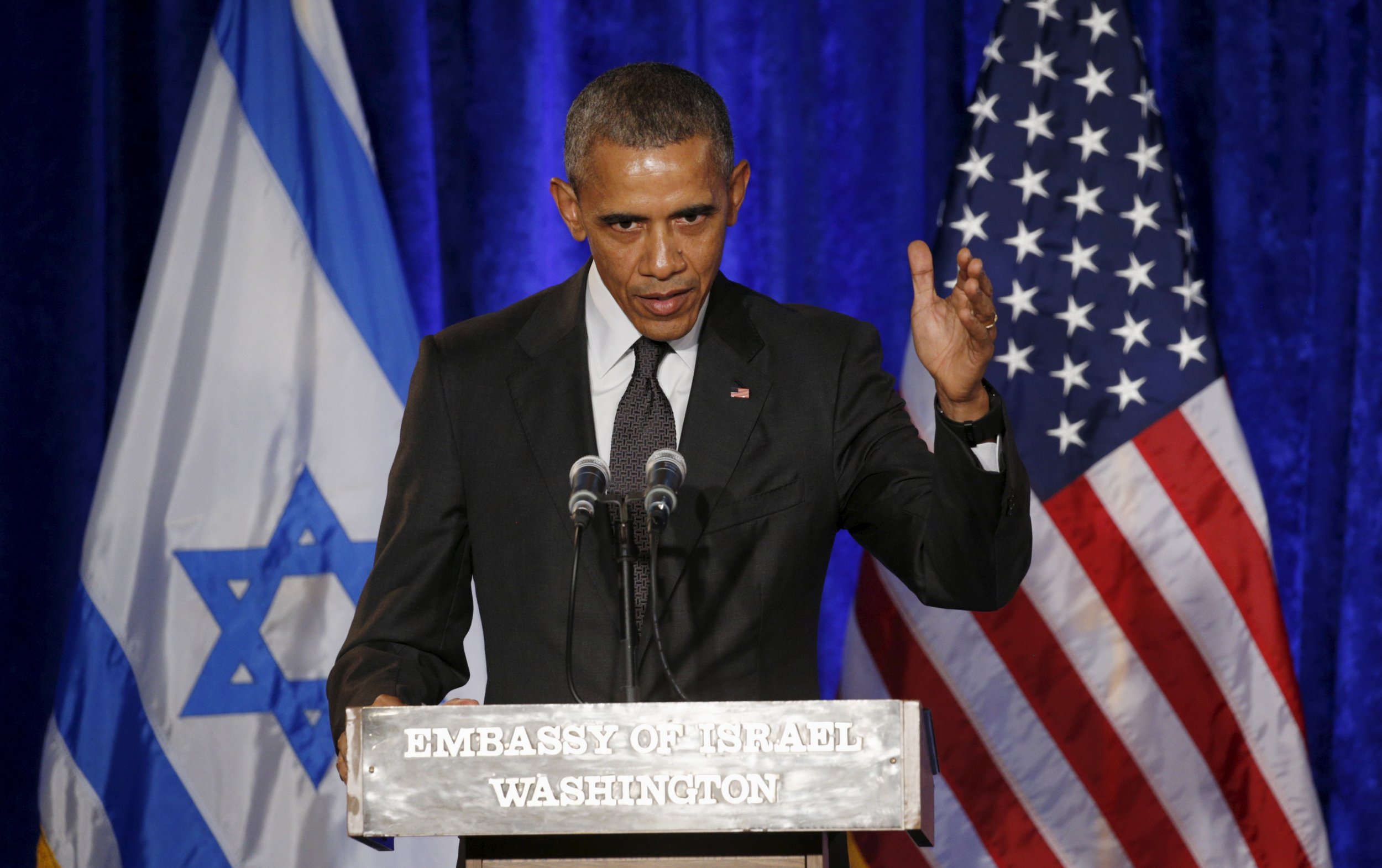
Wednesday, January 27, was International Holocaust Remembrance Day, which commemorates the liberation of survivors from Auschwitz, the largest Nazi concentration and death camp.
Israel's official day set aside for Holocaust commemoration takes place in the spring and is timed to the anniversary of the Warsaw Ghetto uprising.
Wednesday was also the day Israelis watched images of Italy's enthusiastic reception of Iranian President Hassan Rouhani, the head of state of a country that is holding its annual contest for the best cartoon poking fun at the Holocaust.
Now that the sanctions surrounding Iran's illegal nuclear program have been removed, Europeans have been tripping over themselves to do business with this murderous regime, whose behavior has not been tempered by the newly signed P5+1 agreement.
In contrast, Israelis woke up this morning to hear the story of President Barack Obama's participation at the event commemorating International Holocaust Remembrance Day at the Israeli Embassy. To those in Israel, particularly those on the right who do not like Obama, it was a moment of cognitive dissonance to hear the U.S. president say:
Here, tonight, we must confront the reality that around the world, anti-Semitism is on the rise. We cannot deny it. When we see some Jews leaving major European cities, where their families have lived for generations, because they no longer feel safe; when Jewish centers are targeted from Mumbai to Overland Park, Kansas; when swastikas appear on college campuses—when we see all that and more, we must not be silent.
The president went on to say that when any Jew anywhere is targeted just for being Jewish, we all have to respond as Roddie Edmonds (a U.S. vet who was honored for saving Jews during the Holocaust) did—with the words "We are all Jews."
Obama ended the night by saying, "God bless the state of Israel."
Obama's words were a soothing counterpoint to remarks by U.N. Secretary-General Ban Ki-moon, who while condemning violent attacks seemingly justified them against Israelis by saying that due to "the stifling occupation of the Palestinians," it is "human nature" to protest occupation.
While most Israelis realize there is some connection between the occupation and violence, they also know that the violence started before the 1967 Six-Day War, and in fact even before the establishment of the state.
The most recent heinous attacks have taken a different turn, as the knifings have been directed at women and have resulted in the death of two. For the past few days, Israelis have been seeing photos of the smiling faces of Dafna Meir and Shlomit Krigman, two young women cut down in the prime of their lives. It is hard to understand how the U.N. secretary-general can find any excuse that justifies the knifing of two unarmed women in or near their homes.
Moreover, Israelis sense of personal safety has not been enhanced this week by the latest disclosures related to the Dizengoff attack three weeks ago.
First was the announcement that the shooter was clearly influenced by the Islamic State militant group (ISIS). The shooter's intentions were made clear in footage he filmed immediately before the shooting, in which he spouted ideological rants of the sort associated with supporters of ISIS. It also has become clear the shooter had hoped to execute a second attack.
Second, it came to light that the Israeli police ignored key statements from witnesses who said they had sat next to the shooter on a bus on which he was headed back to his home community in Wadi Ara. This report, combined with other recent events, gives Tel Aviv residents the unsettling feeling that local police have more in common with the Keystone Cops than with the elite army units Israelis rely on for their defense.
Against this security backdrop, there has been an intensified campaign by right-wing politicians—both inside and outside the government—railing against all alternative views.
The newest edition of the national civics textbook has elicited strong criticism on the part of many who have seen excerpts. That criticism spurred Minister of Education Naftali Bennett (from the Habayit Hayehudi "Jewish Home" religious party) to call his opponents "left-wing agitators."
At the same time, Likud's minister of culture and sport, Miri Regev, has introduced new legislation that she hopes will guarantee that only institutions that steadfastly support the state will receive cultural backing from the government.
Finally, the very right-wing organization Im Tirtzu ("If you will it") has initiated a campaign against some of Israel's leading literary figures and cultural icons, such as Amos Oz and Gila Almagor, labeling them foreign moles. The term McCarthyism is now being used as a part of everyday political discourse.
Israeli parliament member Benny Begin from the Likud, the son of former Prime Minister Menachem Begin, referred to Im Tirtzu as a fascist organization, adding on the morning of January 28 that its funding sources must be made public. By the end of the day, Bennett, Regev and even PM Netanyahu had condemned Im Tirtzu's campaign.
In keeping with the icy political climate, residents of Tel Aviv are suffering unseasonably cold weather. It's clear to most that the cold wind blowing is not limited to the weather. The frigid gusts seem to extend externally to the rising tide of anti-Semitism in the world, to our continued conflict with the Palestinians and, possibly even more disturbing, to a deepening internal intolerance.
Historian Marc Schulman is the editor of historycentral.com. An archive of his recent daily reports from Tel Aviv can be found here.
Uncommon Knowledge
Newsweek is committed to challenging conventional wisdom and finding connections in the search for common ground.
Newsweek is committed to challenging conventional wisdom and finding connections in the search for common ground.
About the writer
To read how Newsweek uses AI as a newsroom tool, Click here.








